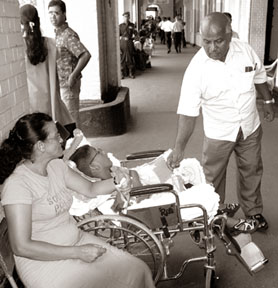|
observer |
|
|
|
|
|
OTHER LINKS |

|

|

|
Never never
While the affluent do their shopping at the Miller's building, Fort, a surrogate mother begs with her autistic child on the pavement, trying to find the means to meet his needs. Should this be the plight of the "special" children of the country? Why are there no organisations to look after them? "Three for hundred. Only today, never again" (Ada vitharai, heta na) shouts a twenty-something, dressed in tight black t-shirt and denim pants slipping precariously down ebony hips, as he weaves a bundle of men's underwear in my face. "In any colour and so cheap" he tries to persuade me further. Shaking him off, I try not to step on intricately stitched lace table cloth, bowls of narang, displays of hair-clips, monkey wrenches, and Sinhala English dictionaries, as I try to find my "assignment". Fort. Friday afternoon. Past the crowd buying lotteries, past the blind couple singing Devuram vehere, past the grouchy lady with the moth-balls, and I am there. Standing next to the uniformed security guard in front of Laksala, I watch them. InnocenceDressed neatly in a short sleeved shirt and knee length trousers, so skinny his arms seem no bigger than matchsticks, its hard not to smile when you see the dreamy grin on his face. Wrapped in a world of his own he seems to be blissfully unaware of the wheelchair, the towel under his chin, the heat, the noise and the flies. Seated next to him, cradling his head in one hand she says "Pinsidda veva" whenever a passer-by stops, digs his hand into his pocket, takes out a ten rupee or twenty rupee note and places it in the white enamel bowl. He is Shehan Madushanka. Nine years old and seemingly suffering from severe autism. She is Indrani, forty-nine, the mother of three children, and the grand mother of seven. "I adopted Shehan when he was three days old" says Indrani. "All my children, Damayanthi, Shantha and Saman are grown-up now, and feeling lonely, I decided to adopt a baby. Initially, I wanted a baby girl, but when I saw Shehan I simply wanted to have him.
Even though she talks to him all the time, Shehan can still utter only one word "unga". He pulls Indrani's hair, licks her face and raises his hands searching for her when he senses she is not near him. "His mother asked me not to tell him about her. When I adopted him I thought one day I will tell him about his past. But now, things are different. He can't do without me and I can't live without him. I hope we will die together". Making one question why there are no organisations to provide free care for special children in the country, every Monday, Wednesday and Friday Indrani and Shehan make their way to the Fort, to their regular niche near Laksala and wait for passing philanthropists to fill the white enamel bowl on Shehan's lap with whatever cash they can spare. Earlier, she had tried to eke out a living by making and selling string-hoppers but had given this up when the expenses increased. Hope"Ananda works as a cashier in a private company and his salary is not enough to pay the rent and look after Shehan. The diapers alone costs Rs. 6,000 a month while the cost of his medicine amounts to around Rs. 4,200", says Indrani. She has no phones and hopes those who wish to help will seek her here, in front of the Laksala in the Fort on any Monday, Wednesday or Friday from around nine to two in the afternoon or come to her house, at T 10, Bandaranayake Pura, Rajagiriya. Determined not to give up, she says there are slight improvements in Shehan, now. "At first the doctors said he is totally blind. But now they say if the wounds in Shehan's brain can be cured he might be able to see". Bringing to mind "The Shawshank Redemption" where Tim Robbins insists "Hope is a good thing" Indrani concludes with the words "I was told to give Shehan up and get on with my life. But I won't. One day, I'm determined to make him well". |

 I didn't know at the time that he is severely disabled, but even if I
had known, I would still have had him".Her husband, Ananda too loves
Shehan and so do all her other children. They don't mind the fact that
now their mother's whole life is centred round their adopted brother.
"They realize he needs more love and care than an ordinary
nine-year-old", says Indrani.
I didn't know at the time that he is severely disabled, but even if I
had known, I would still have had him".Her husband, Ananda too loves
Shehan and so do all her other children. They don't mind the fact that
now their mother's whole life is centred round their adopted brother.
"They realize he needs more love and care than an ordinary
nine-year-old", says Indrani. 





